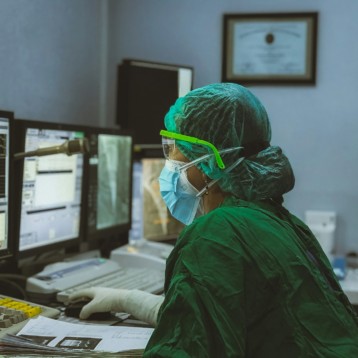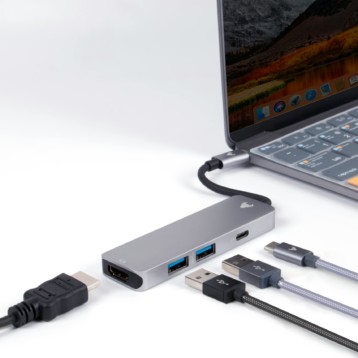Modern healthcare faces increasingly different challenges, stemming from the rise of the worldwide population to the pandemic effects that made telemedicine an integral part of the industry. Artificial intelligence has already shown that it can be a true asset in tackling different issues and improving overall healthcare quality and patient outcomes.

AI is already prevalent in healthcare and other industries. How can leveraging AI’s capabilities assist in keeping people healthy and accurately diagnosed, and is it possible to decrease medical costs with the use of technology? These are only some questions regarding the future of AI in healthcare.
Data Analytics – AI’s Main Healthcare Asset
Artificial intelligence can use its data analytics capabilities to empower doctors, nurses, and other medical professionals with information that would otherwise take a lot of time to sort through. Statistical pattern recognition includes taking data about a single patient and comparing it to a huge pool of information. By identifying patterns, AI could make a diagnosis for different medical conditions.
Here’s how AI’s already being used or could be applied in preventive healthcare:
- Identifying the risk of developing cancer or other medical conditions. AI is already an important asset in analyzing medical imaging. It can catch things that are unnoticeable to the human eye. Artificial intelligence can even identify individuals with the highest risk of developing breast or other cancer types, or medical conditions like heart failure and diabetes.
- Using AI in intensive care units and emergency rooms. Technology can help in prioritizing patients or identifying those who are at the highest risk of suffering a major medical event in the near future. AI can monitor mechanical ventilators and warn when adjustment is necessary or identify signs of sepsis at an early phase.
- Determining fetuses in distress. AI can compare information received from fetal heart monitors to existing available data, leading to determine if a fetus is in distress.
If we think about the future, it’s only a matter of time before most healthcare providers worldwide will have real-time data regarding patients, as well as recommendations on the best course of action. On a nationwide scale, decision-makers will have more information about the health of the population. Combining information from patients’ records and other sources like air quality and sewage analysis could assist in creating strategies to improve overall population health.
The biggest challenge to using AI’s capabilities in data analytics is the lack of reliable data. Healthcare is a specific industry, and entering wrong information or using an unreliable data pool could result in incorrect AI recommendations, which could compromise a patient’s health and life.
Also Read: Top 6 Factors To Consider When Choosing A Surgeon
Virtual Health Assistants
Downloadable apps can serve to monitor health in different areas, such as sticking to a diet or staying properly hydrated. Many healthcare institutions use software to enable remote contact between the patient and the caregiver. Patients can schedule appointments or ask questions regarding their condition and receive an answer without having to visit the facility. That could prove to be an important factor in reducing the risk of spreading contagious diseases and could be vitally important if another pandemic occurs.
Many individuals use wearable smart devices to monitor health parameters like heart rate. These devices can identify any unusual change and report it or recommend checking in with a healthcare provider.
Using chatbots, apps, and health assistants will only increase in the future as these tools become more empowered by AI’s capabilities. For example, a chatbot can be told an individual’s mental health and recommend different actions. But in situations in which there’s been an escalation, the bot will refer the patient to a human doctor.
ChatGPT or other large language models, which are actually deep learning algorithms, can also serve as virtual health assistants. They are capable of answering questions patients have about their symptoms and severity while offering tips on how to manage their health better. This can be helpful in underserved or remote areas.
Prescriptions Are the Present – Is Drug Discovery the Future?
Statistical pattern recognition and other AI capabilities can help determine the best possible healthcare treatment for specific patients. That includes medication prescriptions, as well as suitable dosages. It’s vital to underline that AI’s task is only to issue suggestions on the treatment, and a healthcare provider should make the final call. Some tools will even suggest several options suitable for a particular patient, and the medical professional can check AI recommendations to confirm they picked the appropriate treatment.
Another use of artificial intelligence lies in monitoring patients who administer medications themselves. Some people have problems understanding how to use an inhaler or insulin pen correctly, which can lead to not receiving the right dose or any treatment at all. That can increase hospitalization and healthcare costs and compromise a positive outcome. AI uses wireless sensing systems to identify mistakes made during medication administration and warn the patient.
AI’s unique traits could also be helpful in new drug discovery. The path from identifying a new drug to putting it into use is long and expensive. Technology can assist in shortening the path to discovering new drugs.
AI’s capability of analyzing tons of healthcare data at a fast rate can help in determining which substances have better effectiveness against specific diseases. Artificial intelligence can provide actionable information on whether substances are safe for humans and offer details on the price and the complexity of making those compounds.
Analyzing information from clinical trials is another way AI can help during the drug discovery process. That analysis could provide details if certain patient types react better to a particular treatment.
Also Read: Top 3 Tips For Surviving A Long Hospital Stay
The Future Is in AI and Healthcare Providers Working Together
AI’s application to different industries and areas of life should present an exciting future for humanity. As for healthcare, there’s no intention for artificial intelligence to replace doctors or other medical workers. Similar to other technological aspects, the idea is for AI to be a useful tool for healthcare providers. AI will look to automate manual and repetitive tasks and adjust working processes to improve efficiency or accuracy.
For example, it could take days or weeks for a human to compare information received from a patient with data from an entire population. However, AI’s capability to analyze huge data quantities while eliminating the risk of human error can prove of extreme importance. Healthcare providers will receive actionable insights quickly while having more time to focus on patients. It’s clear that working together is the road to a better future for AI’s healthcare applications and by leveraging the power of this technology, healthcare will be capable of enhancing patient care and outcomes significantly.










